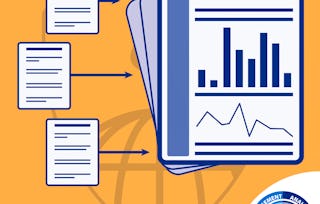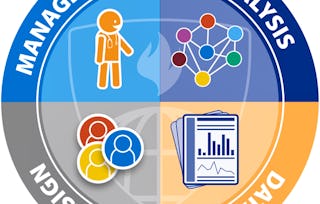In this course, you’ll learn about the more advanced elements of managing clinical trials. From anticipating and planning for protocol events to conducting systematic reviews to synthesize evidence, you and your study team need the skills to implement best practices throughout the trial process. You’ll learn how to recognize and respond to problems and adverse events, comply with regulations, and participate in frameworks that promote transparency. You’ll also learn how systematic review and meta-analysis is used to synthesize evidence from multiple sources. Finally, you’ll learn how your research can benefit from the adoption and consistent use of standardized study documents.

Clinical Trials Management and Advanced Operations
Ends soon: Gain next-level skills with Coursera Plus for $199 (regularly $399). Save now.

Clinical Trials Management and Advanced Operations
This course is part of Clinical Trials Operations Specialization



Instructors: Ann-Margret Ervin, PhD, MPH
12,982 already enrolled
Included with
(100 reviews)
Recommended experience
What you'll learn
Detect and respond to protocol events
Recognize and respond to misconduct
Safeguard participant safety and trial integrity
Develop and maintain study documents
Skills you'll gain
Details to know

Add to your LinkedIn profile
5 assignments
See how employees at top companies are mastering in-demand skills

Build your subject-matter expertise
- Learn new concepts from industry experts
- Gain a foundational understanding of a subject or tool
- Develop job-relevant skills with hands-on projects
- Earn a shareable career certificate

There are 5 modules in this course
Protocol events are problems of varying magnitude that happen over the course of a clinical trial. They can affect patient safety, data integrity, or other aspects of the trial and need to be appropriately categorized and reported. You and your team need to be prepared to recognize, document, and respond to every type of protocol event.
What's included
3 videos1 reading1 assignment
In this module, you’ll learn about regulatory affairs in clinical trials and how to avoid trial misconduct, which is handled differently from protocol events. Trial investigators are held to federal and local standards in their study conduct, and Institutional Review Boards (IRBs) along with federal agencies are in charge of enforcement. The ramifications for trial investigators engaging in fraud or trial misconduct can result in loss of funding or even legal consequences, so you and your team need to be aware of these expectations and plan for strict compliance throughout your trial.
What's included
5 videos1 assignment
In this module, we'll be discussing standardization of research practices, transparency of study activities, and research reproducibility. Standardization improves dissemination of results, easing the possibility of selective reporting between trials and facilitating a complete view of the full body of evidence. Standards for research practice enable study replication, allowing other investigators to duplicate your results for verification purposes. Transparency allows for effective adjudication by journal editors and others who might wish to review your study data. Finally, protocol development and trial registries hold the investigators to the outcomes they pre-specified in their protocol development.
What's included
4 videos1 assignment
In this module, you’ll learn about addressing a clinical trial question of interest by synthesizing evidence from various trials. A systematic review focuses on a specific question, and systematic reviewers use explicit, transparent, and replicable scientific methods to identify, select, appraise, and summarize similar but separate studies. Meta-analysis is an optional component of systematic reviews that allows quantitative assessments of outcomes from similar trials.
What's included
6 videos1 assignment
In this module, you’ll learn about the standardized study documents used in a clinical trial, including the types of documents and why they’re used. You’ll also learn best practices for creating study documents and the principles for maintaining and managing them.
What's included
13 videos1 reading1 assignment
Earn a career certificate
Add this credential to your LinkedIn profile, resume, or CV. Share it on social media and in your performance review.
Instructors


Offered by
Explore more from Public Health
 Status: Free Trial
Status: Free TrialJohns Hopkins University
 Status: Free Trial
Status: Free TrialJohns Hopkins University
 Status: Free Trial
Status: Free TrialJohns Hopkins University
 Status: Free Trial
Status: Free TrialJohns Hopkins University
Why people choose Coursera for their career




Learner reviews
100 reviews
- 5 stars
85%
- 4 stars
10%
- 3 stars
2%
- 2 stars
0%
- 1 star
3%
Showing 3 of 100
Reviewed on Jul 23, 2024
This has helped in my studies as well as will be helpful in future
Reviewed on Aug 22, 2023
Team Coursera has arranged a very comprehensive, up-to-date and knowledgeable. Hats off to the team
Reviewed on Apr 23, 2023
Gives good idea of Clinical Trials management and operations.
Frequently asked questions
To access the course materials, assignments and to earn a Certificate, you will need to purchase the Certificate experience when you enroll in a course. You can try a Free Trial instead, or apply for Financial Aid. The course may offer 'Full Course, No Certificate' instead. This option lets you see all course materials, submit required assessments, and get a final grade. This also means that you will not be able to purchase a Certificate experience.
When you enroll in the course, you get access to all of the courses in the Specialization, and you earn a certificate when you complete the work. Your electronic Certificate will be added to your Accomplishments page - from there, you can print your Certificate or add it to your LinkedIn profile.
Yes. In select learning programs, you can apply for financial aid or a scholarship if you can’t afford the enrollment fee. If fin aid or scholarship is available for your learning program selection, you’ll find a link to apply on the description page.
More questions
Financial aid available,





